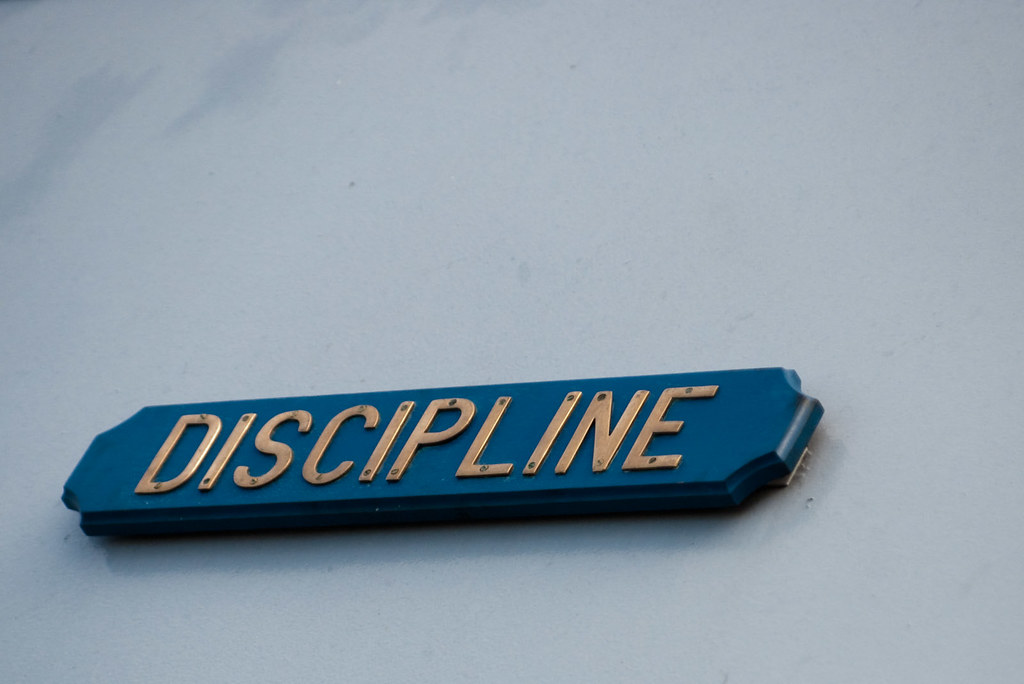This post may contain affiliate links, which means that I may earn a commission if you click on the link or make a purchase using the link. When you make a purchase, the price you pay will be the same whether you use the affiliate link or go directly to the vendor’s website using a non-affiliate link.
Motivation is a liar. There, I said it. One minute, you’re excited about a goal. The next? You’re struggling to even get started. I’ve been there. When I began my weight loss journey, I had all the motivation in the world… until I didn’t. What kept me going? Self-discipline. When I lost over 80lbs, it wasn’t because I always wanted to work out or eat healthy. It was because I leaned on self-discipline, especially when motivation disappeared. And to help with this, I want to discuss some examples of self-discipline.
In this post, I’ll break down:
- What self-discipline really is.
- Examples of self-discipline that worked for me.
- How to stay consistent, even when motivation fades.
Let’s get started with ‘Examples of Self-Discipline: How to Stay Consistent’!

Table of Contents
- What is Self-Discipline? (And Why It’s Better Than Motivation)
- Real-Life Examples of Self-Discipline
- Tips to Build Self-Discipline
- How to Stay Consistent When Motivation Fades
- Conclusion
- Further Resources
What is Self-Discipline? (And Why It’s Better Than Motivation)
Let’s get one thing straight—self-discipline isn’t about being perfect or forcing yourself to do things you hate.
It’s about making small choices every day that get you closer to your goals, even when you don’t feel like it.
When I was losing weight, I wasn’t always motivated to work out.
In fact, there were SO MANY days when I wanted to skip it entirely. But self-discipline is what made me lace up my trainers anyway and show up.
That’s the difference.
Motivation might get you started, but self-discipline is what keeps you going when the excitement fades.
So, what exactly is self-discipline?
It’s choosing the long-term goal over the short-term comfort.

It’s the ability to act even when your mind and body are telling you to do something easier.
And let’s be honest—it’s not glamorous.
But it’s the reason I was able to lose over 80lbs, and it’s the same thing that can help you stay consistent too.
If you looking for serious examples or self-discipline, David Goggins is a huge inspiration when it comes to pushing past your limits. His book Can’t Hurt Me is full of powerful lessons on how to harness mental toughness and develop a relentless level of self-discipline.
His take on willpower is a powerful example of how discipline beats motivation every time. If you’re looking for that extra push, his story is a must-read. You can also dive into more of his wisdom here: Self-Discipline Importance: Willpower Inspired by David Goggins.
Real-Life Examples of Self-Discipline
1. Showing Up, No Matter What
There were so many mornings when the last thing I wanted to do was work out.
It was too cold, too early, I was just exhausted, and my motivation was nowhere to be found.
But instead of giving in, I leaned on self-discipline.
I’d tell myself, “Just start. Even if it’s a 10-minute walk, just get moving.”
And once I got started? It was always easier to keep going.
The hardest part was showing up.

Self-discipline is all about showing up, even when you’re not feeling it.
Because the truth is, once you start, it’s never as bad as you thought it’d be.
2. Choosing Better, Not Perfect
Another key moment of self-discipline came with food choices.
Trust me, I love pizza and sweets as much as the next person.
But during my weight loss journey, I had to practice choosing better, not perfect.
It wasn’t about never having treats, but about being mindful and disciplined with my decisions.
Instead of having a whole pizza, I’d stop after a few slices and assess my hunger.
I wasn’t perfect, but I was consistent.
And that’s where self-discipline wins every time—it’s not about perfection, but progress.
Incorporating good habits into your day will help you stay on track and prevent those moments of regret later on.

3. Building a Routine You Can Stick To
I can’t stress enough how important routine was for me, especially because I have ADHD.
Routine is something I really need, but it’s also something I’ve always struggled with.
My mind is CONSTANTLY jumping from one thing to the next, so creating a structure that kept me on track when learning how to stay consistent with goals.
Self-discipline doesn’t mean making everything hard on yourself.
It’s about finding a routine that supports your goals and makes it easier to stick to them.
For me, that looked like working out first thing in the morning. If I didn’t do it then, I knew I’d find a million excuses later.
By building this routine, I didn’t have to rely on motivation.
It became automatic—something I did without overthinking.
And self-discipline helped me stick to it, even on the days when I wasn’t feeling it.
Pro Tip: Have different versions of your routine ready. Life isn’t always predictable, so having a “lazy day” routine, an “ideal day” routine, and an “extra productive” one can help you stay on track, no matter how you’re feeling. This makes it easier to adapt without falling off, which is a key part of learning how to be consistent.
If you’re hitting a plateau in your journey and self-discipline feels tough, affirmations can really help reinforce your mindset. I’ve shared some of my favourite self-discipline affirmations that can get you through those rough patches in this post: Self-Discipline Affirmations To Help With Weight Loss Plateaus.
Tips to Build Self-Discipline
1. Focus on the Bigger Picture
When motivation fades, it’s easy to forget why you started.
That’s why it’s so important to keep your long-term goals front and centre.
When I was losing weight, I constantly reminded myself of why I wanted to make these changes.
Whether it was to feel healthier, have more energy, or just fit into my favourite jeans again, keeping that bigger picture in mind helped push me through the tough days.
Building a strong mindset can be just as important as any physical training. 🧠 If you’re interested in adopting an athlete’s mindset to push through challenges and stay disciplined, my post on athlete mindset training has some great strategies to get you started.
2. Use Tools to Stay Accountable
I’m a big fan of accountability. It’s hard to stay disciplined when you feel like no one’s watching. During my journey, I used everything from habit trackers to apps that reminded me to drink water or log my meals.
It wasn’t always about being perfect, but those little tools kept me on track and aware of my progress.

Find something that works for you, whether it’s a habit tracker or even telling a friend about your goals. Accountability makes self-discipline easier and can help you improve life in small, consistent steps.
Accountability makes self-discipline easier.
3. Celebrate the Small Wins
Self-discipline isn’t about grinding 24/7 with no reward.
In fact, one of the most important parts of building discipline is celebrating those small wins along the way. During my weight loss journey, and with any goal I have had since I made sure to reward myself for hitting milestones.
Whether it was buying a new pair of leggings or taking a rest day.
Those small celebrations give you something to look forward to and reinforce your self-discipline.
It’s like telling yourself, “Hey, I’m doing great. Keep going!”
Small habits really do lead to big results, and it’s the success of those habits and daily routines that make all the difference in your journey. If you want to dive deeper into how small habits can transform your progress, take a look at this post: The Importance of Consistency: Small Habits Lead to Big Results!
Or, for more strategies on how to master these small habits, Atomic Habits by James Clear is the perfect guide.
How to Stay Consistent When Motivation Fades

At the end of the day, staying consistent is what really matters. Motivation comes and goes, but self-discipline is something you can rely on. Here’s how to keep going, even when you don’t feel like it:
- Revisit your goals. When you feel stuck, go back to your “why.” Why did you start? What’s the bigger picture?
- Lean on your routine. Having a routine in place means you don’t have to think about it. It becomes automatic.
- Stay flexible. Life happens. It’s okay to adjust your goals and routine as long as you don’t quit.
Staying consistent is the real secret to success, and if you’re looking for even more ways to keep going when motivation is nowhere to be found, check out this post: Consistency Over Motivation: 5 Ways to Stay on Track.
Conclusion
Motivation is a rollercoaster, but self-discipline is your steady ride.
It’s not always easy, but it’s what will get you to your goals, whether it’s losing weight, getting stronger, or just showing up for yourself.
Consistency is the hardest part of any weight loss journey, especially when things aren’t going as planned. If you’re struggling with this, I’ve shared more tips on how to overcome those dips in progress here: Overcoming a Lack of Consistency in Your Weight Loss Journey.
So, here’s the question: What’s one small habit you can commit to today? Let me know in the comments! Or share some of your own examples of self-discipline!
Because trust me, it’s those small, consistent actions that will make all the difference.

Further Resources
Studies
Motivation, Self-Determination, and Long-Term Weight Control – This study discusses how self-determination, rather than just initial motivation, plays a crucial role in long-term weight management. It highlights that feeling autonomous about weight-loss goals and behaviours leads to lasting change (Teixeira et al., 2012).
Personal Motivation, Self-Regulation Barriers, and Strategies for Weight Loss – This research identifies the importance of self-regulation and mental strategies in overcoming barriers to weight loss. It highlights how habitual overconsumption and external factors can be mitigated by mindful self-discipline and mental tenacity (Chew et al., 2022).
Self-Control in the Weight Loss Process – This study focuses on how self-control mechanisms such as mental simulations and implementation intentions are more effective in reaching weight-loss goals than relying solely on motivation (Marszał-Wiśniewska & Jarczewska-Gerc, 2018).
Motivational Predictors of Weight Loss and Weight-Loss Maintenance – This study reinforces the role of autonomous motivation in weight-loss success and maintenance, showing that self-determined goals lead to better adherence and lasting outcomes (Williams et al., 1996).
Self-Efficacy for Temptations is a Better Predictor of Weight Loss than Motivation – This research emphasises that managing temptations and having self-efficacy in resisting them is a stronger predictor of weight loss success than initial motivation (Armitage et al., 2014).
